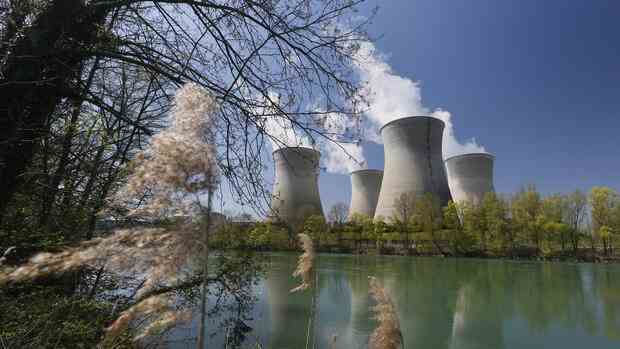The Greens criticize that the same conditions should apply to investments in nuclear power plants as to renewable energies.
(Photo: REUTERS)
Brussels Electricity prices in Europe are set to fall, while investments in power generation are set to increase. To achieve this, EU Energy Commissioner Kadri Simson wants to create new ways to use state money when investing in nuclear power and renewable energy.
Their reform of the electricity market design is a reaction to the turbulence in the energy markets last year, when soaring gas prices dragged electricity costs with them. From the Commission’s point of view, the short-term markets functioned well for the most part.
At the same time, there are too few electricity supply contracts with longer terms. Such contracts would cushion fluctuations in the market. That is why the conditions for long-term contracts between electricity producers and intermediaries are now to be improved. Private electricity customers should also have the right to an electricity contract at a fixed price. So far, this has not been the case in some EU countries.
France delighted criticism from the Greens
New state subsidies should also contribute to stable prices. To this end, the Commission wants to prescribe that all state support in future be processed via so-called bilateral contracts for difference. A price is set at which a power generator is remunerated. This gives investors more security because they no longer have to fear falling electricity prices.
At the same time, customers get stable electricity tariffs. The state takes the risk. If the market price is higher than the price specified in the contract for difference, the electricity producer has to pay money. According to the Commission’s proposal, this should then benefit electricity customers.
>> Read here: Fragmented, improperly regulated, prone to manipulation – the Court of Auditors criticizes the European electricity market
The same conditions apply to investments in nuclear power as to investments in renewable energies. In France, which continues to rely on nuclear power, the proposal is therefore met with approval.
It is absurd that the price of renewable energies and nuclear power has so far depended on the price of gas, said the chairman of the environment committee in the European Parliament, Pascal Canfin. He belongs to the party of French President Emmanuel Macron.
The Greens, on the other hand, criticize the Commission: “Investments in nuclear energy mean investments in the past,” said MP Michael Bloss. “Nuclear energy is expensive and depends on massive government subsidies.”
>> Read here: Up to 600 billion euros – The energy transition requires enormous investments
In Germany, even stronger interventions in the market were feared, which are not happening for the time being. “The EU would do well to optimize the electricity market with a sense of proportion,” said Deputy BDI General Manager Holger Loesch. “It must not undermine the economic principles of the electricity market from the crisis mode.”
The DIHK sees it positively that small and medium-sized companies are to be supported in concluding long-term electricity supply contracts. The steel trade association warns that the reform has not solved the problem of high electricity prices for industry.
More: EU is pushing for more long-term contracts in the electricity market – corporations are reducing investments
